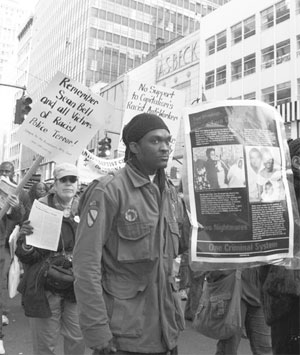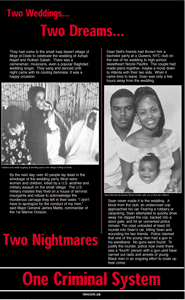Revolution #83, March 25, 2007
Three NYPD Cops Indicted
Still Needed: Justice for the Murder of Sean Bell
On November 25 of last year, 23-year-old Sean Bell was murdered by the NYPD. Months later, on March 16 of this year, after listening to 60 to 70 witnesses and examining exhibitions, maps, photos, and toxicology reports, a grand jury handed down indictments on three of the five cops involved. And, while not yet officially confirmed as we go to press, the mass media is reporting that the panel has charged two of these cops with second-degree manslaughter and the third with reckless endangerment. (The arraignment and opening of the sealed grand jury envelope spelling out the charges was scheduled for Monday, March 19, after the printing of this issue of Revolution.)
Two things must be clearly said and understood about this. First, all five of the cops should have been indicted for surrounding Sean and his two friends, Trent Benefield and Joseph Guzman, and pumping 50 rounds at them, leaving Sean dead at the scene and nearly killing the other two. Two, the charges leveled against the three cops of second-degree manslaughter and reckless endangerment are not at all commensurate with the horrible crime they committed. They, and the other two as well, should have been hit with the strongest charge the grand jury could have brought down in this case—second-degree murder.
Let's review what happened the night of November 25, as related by a number of eyewitnesses at the scene, who later voluntarily testified before the grand jury. Bell, Benefield, and Guzman went to a club in Jamaica, Queens, joining others there for a bachelor party for Sean, who was planning to be married later that day to his fiancée, Nicole Paultre. At the club, according to eyewitnesses, an argument broke out between the three and two other men, which continued in the club foyer as Bell, Benefield, and Guzman were leaving, and then outside the club. The three, not wanting any trouble on the eve of Sean's wedding, walked away from the club and headed for Sean's car parked a block away.
Also at the club that night was a Black undercover cop, Gescard Isnora, a member of a special NYPD unit that was investigating the spot for possible prostitution and drug activity. Having witnessed the argument inside the club, Isnora messaged unit members who were sitting close by in an unmarked minivan and Toyota Camry that one of the three might have a gun. After the three got into Sean's car, the minivan and Camry arrived while Isnora walked toward Sean's car, hollering at them. The three—as Benefield and Guzman told their attorneys and the media several days later from their hospital beds, to which they had been initially handcuffed—feared they were about to be robbed or car-jacked. Trying to get away, Sean first lurched the car forward, which the police say clipped Isnora, then threw it into reverse and then lurched forward again, hitting the undercover cops' minivan.
Isnora then opened up, firing 11 times, and was immediately joined by the other four. One of them, Michael Oliver, fired 31 times, emptying his clip, reloading and then continuing to fire. In a matter of seconds, Sean Bell was dead, and Joseph Guzman, shot 11 times, and Trent Benefield, hit three times, were fighting for their lives.
Isnora testified that he announced he was a police officer before he began firing and was wearing his police shield around his neck. But a number of eyewitnesses said that is not true, that he never identified himself. Isnora also claimed he thought that Guzman, while sitting in the car, had a gun tucked in his waistband, and that is why the cops feared for their own safety and opened fire. But no gun was found on Guzman, or in Sean's car, or anywhere at the scene—no gun, that is, except the ones the five cops used to mercilessly kill one man and do their best to kill two others.
The cold-blooded murder of Sean Bell brings back terrible memories of how, in 1999, members of another NYPD special unit, the Street Crimes Unit, fired 41 bullets at Amadou Diallo as he stood outside his apartment building, with 19 hitting him and killing him instantly. The cops' rationale? They thought Amadou was reaching for a gun, but in fact he was reaching into his pocket for his wallet, to identify himself. Nor is the execution-style murder of Sean Bell by any means an aberration, some tragic mistake. Documentation by the Stolen Lives Project shows that more than 130 people—the vast majority of them young Black people and other young people of color—have been killed by the NYPD since the murder of Amadou Diallo in 1999. The Stolen Lives Project has also documented that during the 1990's, there were more than 2,000 reported cases nationwide of police murders, again overwhelmingly of Black and Latino youth—a veritable national epidemic that has been growing even worse in the aftermath of 9/11, when police have been given even greater license to kill with impunity.
In fact, of all these thousands of documented cases, only a very small number of cops have ever been indicted, and of those who have, only a very small number have ever been convicted, with most of them receiving very light sentences or even just probation. In that light—and while keeping in mind that all five of the cops who killed Sean Bell should have been indicted and all five should have been charged with second-degree murder—it is something of an accomplishment that three of the five have been indicted at all! And a major reason for this is that thousands in New York poured into the streets in outrage at Sean's murder and declared their determination to see justice done.
 |
|
|
This gets to a very important point. The indictments and charges against the three cops represent only one stage in a long battle to win justice for Sean Bell and, on that basis, to strengthen our resistance to all police murders and police brutality. Already, even before the charges were officially released, attorneys for the three indicted cops, with the full weight of the system at their backs, were bellicosely announcing they will fight this all the way, including the possibility of demanding a change of venue, as in the Amadou Diallo case, in which the four cops who slaughtered him were eventually acquitted.
The trial of the cops who murdered Sean Bell could be year or more away. And while the indictments of the three can be seen as one small step forward, the people need to fight all the way through on this to demand real justice—that these killer cops be convicted and sent to jail.
If you like this article, subscribe, donate to and sustain Revolution newspaper.




